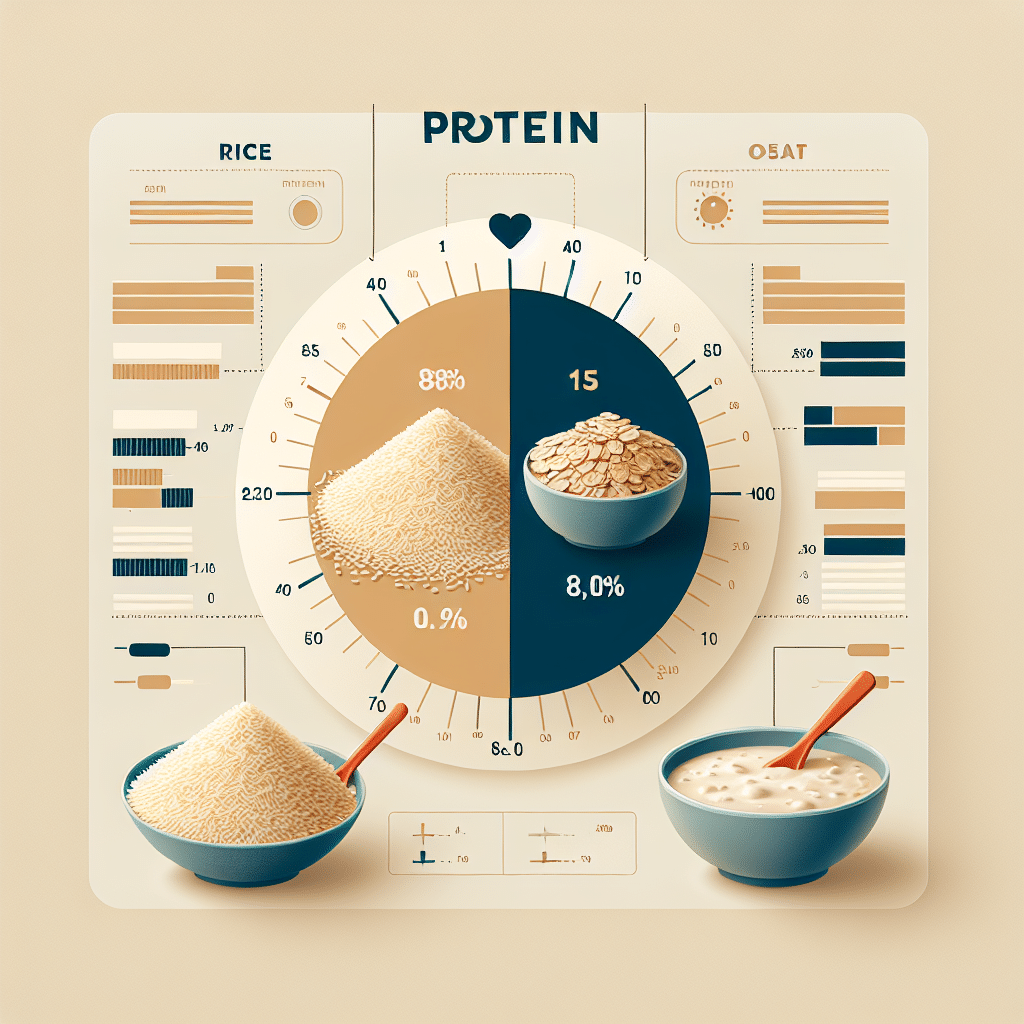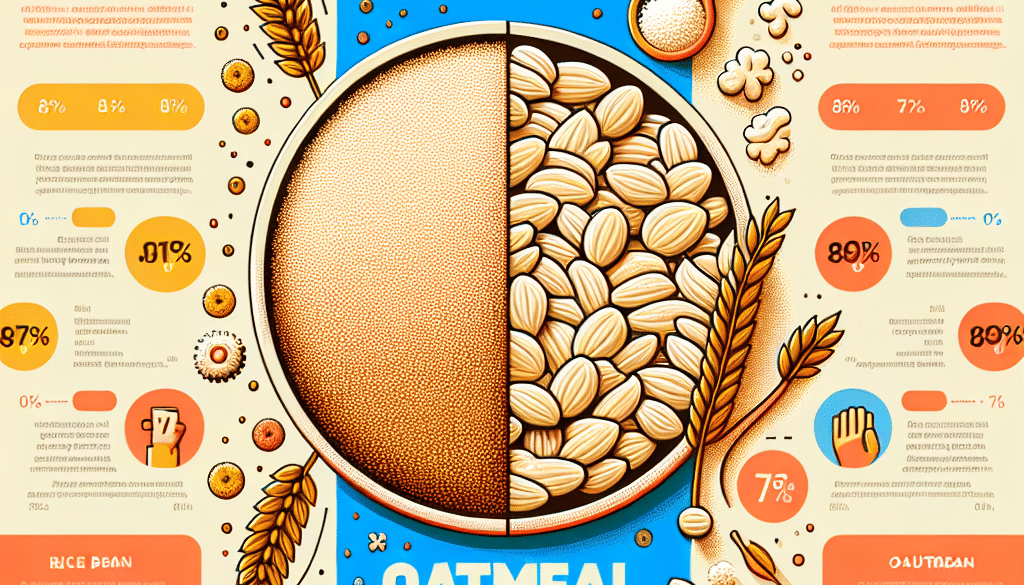Which Has More Protein Rice Or Oatmeal?
-
Table of Contents
- Protein Showdown: Rice vs. Oatmeal
- Understanding Protein in Our Diet
- Nutritional Profile of Rice
- Nutritional Profile of Oatmeal
- Comparing Protein Content: Rice vs. Oatmeal
- Other Nutritional Considerations
- Incorporating Rice and Oatmeal into a High-Protein Diet
- Conclusion: Oatmeal Takes the Protein Crown
- Enhance Your Protein Intake with ETprotein Products
Protein Showdown: Rice vs. Oatmeal

When it comes to choosing the best sources of protein, the debate often extends to comparing various plant-based options. Two common staples in many diets are rice and oatmeal. Both are versatile, widely available, and integral to numerous cuisines around the world. But when it comes to protein content, which one comes out on top? This article delves into the nutritional profiles of rice and oatmeal to determine which has more protein and how they can fit into a balanced diet.
Understanding Protein in Our Diet
Protein is a macronutrient essential for building and repairing tissues, making enzymes and hormones, and supporting overall health. It’s made up of amino acids, some of which are termed ‘essential’ because our bodies cannot produce them, and we must obtain them from our diet.
Nutritional Profile of Rice
Rice is a staple food for over half of the world’s population. It comes in various forms, including white, brown, black, and red, each with its unique nutritional benefits. Generally, rice is known for its carbohydrate content, but it also provides protein.
- White Rice: A cup of cooked white rice contains about 4.2 grams of protein.
- Brown Rice: A cup of cooked brown rice offers around 5 grams of protein, along with higher fiber content and nutrients compared to white rice.
While rice does contain protein, it’s not a complete protein as it lacks adequate amounts of some essential amino acids, particularly lysine.
Nutritional Profile of Oatmeal
Oatmeal is a whole-grain powerhouse that’s not only rich in fiber but also a good source of protein. It’s a popular breakfast choice and can be enjoyed in various forms such as rolled oats, steel-cut oats, and instant oats.
- Rolled Oats: A cup of cooked rolled oats contains approximately 6 grams of protein.
- Steel-Cut Oats: A cup of cooked steel-cut oats has about 5 grams of protein.
Oatmeal also contains a better balance of essential amino acids than rice and is particularly high in the amino acid threonine.
Comparing Protein Content: Rice vs. Oatmeal
When directly comparing the protein content of rice and oatmeal, oatmeal generally comes out ahead. Not only does oatmeal contain more protein per serving, but the quality of protein is also higher due to a more favorable amino acid profile.
Other Nutritional Considerations
While protein content is important, it’s not the only factor to consider when choosing between rice and oatmeal. Here are some other nutritional aspects to keep in mind:
- Fiber: Oatmeal is higher in dietary fiber, which is beneficial for digestive health and can help with weight management.
- Vitamins and Minerals: Both rice and oatmeal contain essential vitamins and minerals, but the profiles differ. Oatmeal is a good source of magnesium and zinc, while brown rice provides selenium and manganese.
- Caloric Density: Rice is more calorie-dense than oatmeal, which may be a consideration for those managing their weight.
Incorporating Rice and Oatmeal into a High-Protein Diet
For those looking to increase their protein intake, both rice and oatmeal can be part of a high-protein diet when combined with other protein-rich foods. Here are some suggestions:
- Pairing brown rice with beans or lentils to create a complete protein with all essential amino acids.
- Adding nuts, seeds, or protein powder to oatmeal to boost its protein content.
- Including a variety of other protein sources such as tofu, tempeh, quinoa, and meat substitutes in meals.
Conclusion: Oatmeal Takes the Protein Crown
In the comparison of rice versus oatmeal for protein content, oatmeal emerges as the winner. Not only does it contain more protein per serving, but it also offers a better amino acid profile, making it a more complete protein source. However, both rice and oatmeal have their place in a balanced diet, and their nutritional benefits extend beyond just protein.
When choosing between the two, consider your dietary needs, the balance of your overall meal, and personal preferences. Remember that variety is key in a healthy diet, and combining different foods can help ensure you get all the essential nutrients your body requires.
Enhance Your Protein Intake with ETprotein Products
If you’re looking to supplement your diet with high-quality protein sources, consider ETprotein’s range of organic bulk vegan proteins. Their products, including organic rice protein and other plant-based options, are non-GMO, allergen-free, and feature a neutral taste, making them an excellent addition to any diet.
Whether you’re involved in sports nutrition, weight management, or simply seeking to improve your overall health, ETprotein offers a diverse selection of proteins to meet your needs. Their commitment to purity and quality ensures that you’re getting the best possible product to support your dietary goals.
About ETprotein:
ETprotein, a reputable protein and L-(+)-Ergothioneine (EGT) Chinese factory manufacturer and supplier, is renowned for producing, stocking, exporting, and delivering the highest quality organic bulk vegan proteins and L-(+)-Ergothioneine. They include Organic rice protein, clear rice protein, pea protein, clear pea protein, watermelon seed protein, pumpkin seed protein, sunflower seed protein, mung bean protein, peanut protein, and L-(+)-Ergothioneine EGT Pharmaceutical grade, L-(+)-Ergothioneine EGT food grade, L-(+)-Ergothioneine EGT cosmetic grade, L-(+)-Ergothioneine EGT reference grade and L-(+)-Ergothioneine EGT standard. Their offerings, characterized by a neutral taste, non-GMO, allergen-free attributes, with L-(+)-Ergothioneine purity over 98%, 99%, cater to a diverse range of industries. They serve nutraceutical, pharmaceutical, cosmeceutical, veterinary, as well as food and beverage finished product distributors, traders, and manufacturers across Europe, USA, Canada, Australia, Thailand, Japan, Korea, Brazil, and Chile, among others.
ETprotein specialization includes exporting and delivering tailor-made protein powder and finished nutritional supplements. Their extensive product range covers sectors like Food and Beverage, Sports Nutrition, Weight Management, Dietary Supplements, Health and Wellness Products, and Infant Formula, ensuring comprehensive solutions to meet all your protein needs.
As a trusted company by leading global food and beverage brands and Fortune 500 companies, ETprotein reinforces China’s reputation in the global arena. For more information or to sample their products, please contact them and email sales(at)ETprotein.com today.












